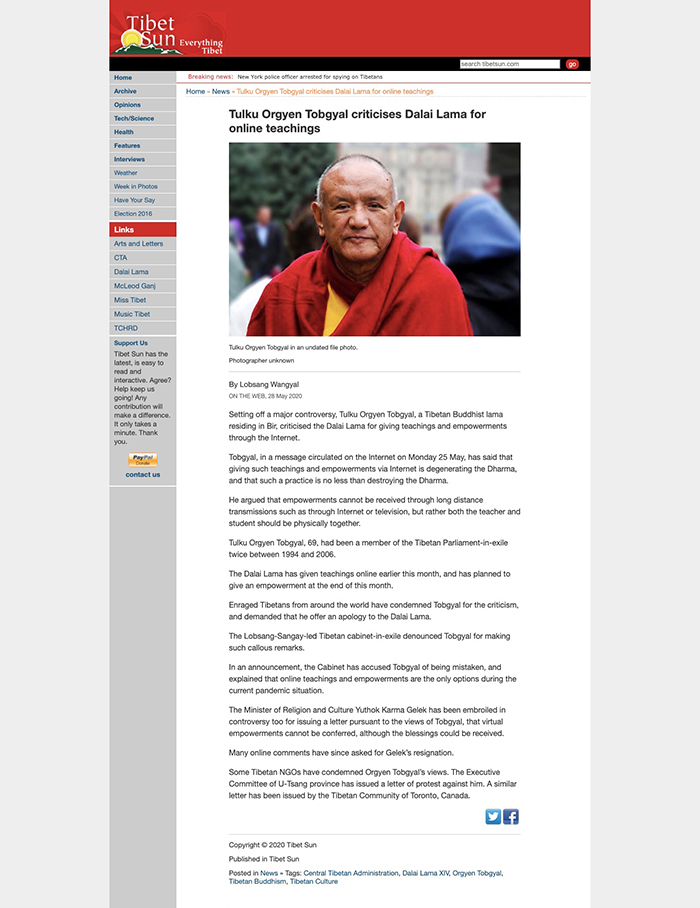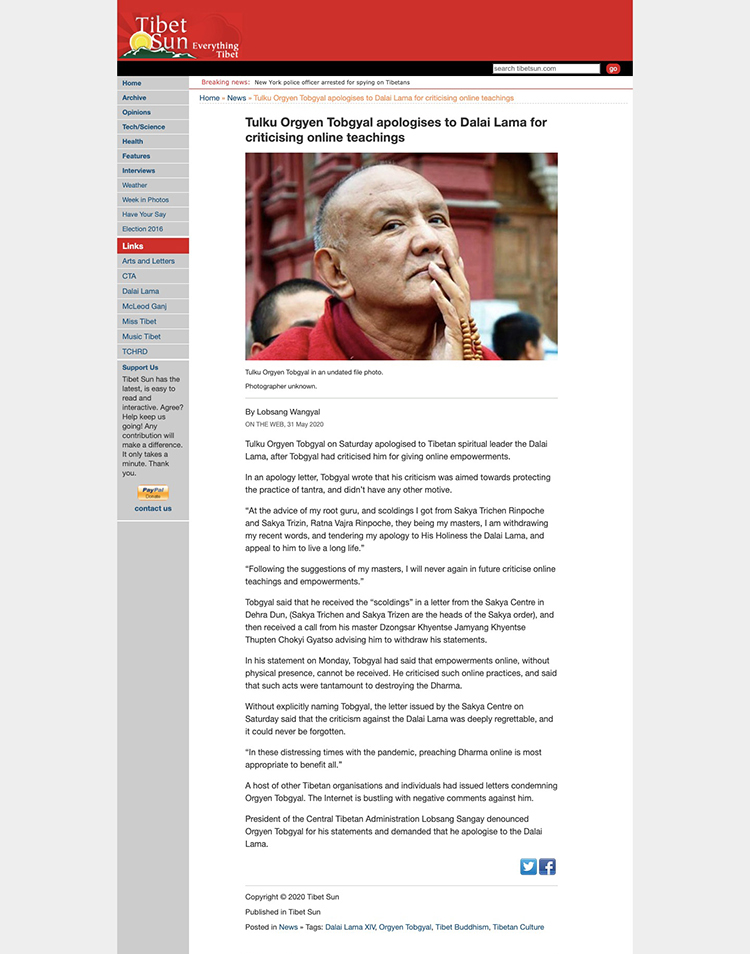
The opinion piece below was sent to dorjeshugden.com for publication. We accept submissions from the public, please send in your articles to [email protected].
By: Shashi Kei
Earlier this year in September, the Central Tibetan Administration (CTA) celebrated its “60th anniversary of the birth of Tibetan democracy”. As expected, the Sikyong Lobsang Sangay delivered his typically high-sounding speech claiming, amongst other things, that the task is upon the shoulders of all Tibetans to “further strengthen our robust democracy”. Lobsang Sangay went on to say that “citizens are at the heart of democracy”.
Sangay claimed that every action of the Chinese government “mocks the values and principles of democracy”. This is a well-worn script that has drawn considerable support for the Tibetan cause and deflected attention to China’s perceived wrongs. But how has the CTA itself fared in terms of respecting democratic values and upholding the rights of its people?
When we scratch even lightly beneath the CTA’s veneer, we find disappointingly that even after 60 years of a so-called democratic governance, the Tibetan people under the CTA are still denied the most basic of freedoms; that is, the freedom of opinion and the freedom of speech.
The Tulku Orgyen Tobgyal controversy is the most recent exhibition of a bogus Tibetan democracy. Tulku Orgyen Tobgyal is a Tibetan lama of the Sakya tradition who has contributed significantly to the preservation of the Tibetan Buddhist tradition. He has also served as a member of the Tibetan Parliament-in-Exile twice between 1994 and 2006.
In May this year, Tulku Orgyen Tobgyal voiced his disagreement and concerns over the Dalai Lama’s decision to give online religious empowerments and tantric teachings. It is worth noting that Tulku Orgyen Tobgyal was not alone on this matter. The CTA’s Religion and Culture Minister, Yuthok Karma Gelek, also issued a statement affirming that empowerments cannot be conferred online.
It is well established within the Tibetan Buddhist system that religious empowerments should only take place within a spiritually intimate environment, when the teacher and the students are physically present before each other and only after a master has assessed the recipient to be qualified.
Therefore, Tulku Orgyen Tobgyal’s opinion was not contrary to Tibetan Buddhist customs that have been upheld for centuries. The Dalai Lama himself has previously confirmed this view to be correct, for example, in this 1993 recording.
[VIDEO] The Dalai Lama proves
Tulku Orgyen Tobgyal is right
Or to watch on YouTube: https://www.youtube.com/watch?v=HroK14K1Q4E
Factually, Tulku Orgyen Tobgyal was correct and constitutionally, as a ‘citizen’ of the democratic Tibetan nation, he was also well within his rights to voice an opinion. This is provided for by Article 12 of the Tibetan Charter, the same constitutional document which is promulgated by the Tibetan leadership as the prime factor that sets the ‘democratic’ CTA apart from the communist regime of China.
However, as we have seen time and again, Tibetan democracy falls apart when tested. And today as it has been since feudal Tibet, it is not the Constitution that governs the people but the diktat of one person, the Dalai Lama. Whatever the Dalai Lama decides becomes law and it becomes a crime to disagree with the Dalai Lama.
Tulku Orgyen Tobgyal had but voiced his opinion over a spiritual matter, which happened to be correct. He had not broken any laws nor had he incited any unrest against the Tibetan government. Neither had he acted against the Tibetan people’s interest in any way. His only ‘crime’ was to disagree with the Dalai Lama about online empowerments.
In response to this, instead of being a responsible leadership which would aim to quell the people’s fury, the Tibetan Kashag (Cabinet) under Lobsang Sangay instead moved to fan the flames of public anger against their colleague. The Kashag issued a public statement condemning Tulku Orgyen Tobgyal, and pronounced his statements to be “derogatory” and “immensely regrettable…and wrong”. In issuing such a statement, the Kashag unleashed a torrent of ill-will against Tulku Orgyen Tobgyal and incited a chorus of vitriolic, violent condemnations of Tulku Orgyen Tobgyal by various Tibetan groups and associations. Tibetans around the world went into a frenzy, enraged that someone had dared to differ in opinion with the Dalai Lama. On various social media platforms, countless death threats and fatwas were issued against Tulku Orgyen Tobgyal.

Yuthok Karma Gelek, the CTA’s Religion and Culture Minister, also faced considerable hostility for his attempts to diffuse the situation.
Yuthok Karma Gelek, the CTA’s Religion and Culture Minister, also faced considerable hostility. The Minister had attempted to diffuse the dispute by explaining that Tulku Orgyen Tobgyal was merely being outspoken and that his statement was without any ill-intent. Clearly, it is also a serious violation to be sympathetic towards someone who disagrees with the Dalai Lama.
A few days later, in the face of such attacks, Tulku Orgyen Tobgyal issued an apology to the Dalai Lama. In his statement, Tulku Orgyen Tobgyal revealed that he received “scoldings” for his opinion, and was made to promise to never again criticize online teachings and empowerments.
In other words, Tulku Orgyen Tobgyal was bullied into submission. So whilst Lobsang Sangay spoke about a “robust democracy”, how can there be a democracy, let alone a robust one, if no Tibetan is allowed to have any views other than that which the Tibetan leadership permits? And how can true Tibetan democracy be established if the CTA treats its own Constitution as nothing more than a bait to dupe the global community into supporting its political agenda?
The Tulku Orgyen Tobgyal controversy exposes a number of facts about the Tibetan leadership:
- ‘Tibetan democracy’ is a complete swindle. Real democracies aspire to empower the voices of its people, not seek to muzzle them with intimidation and incitement of hatred against anyone who dares to have a different opinion to the governing elite. And yet, this is precisely how the Tibetan leadership has been operating.
- The rule of law remains whatever the Dalai Lama decides, or whatever the CTA decides in the name of the Dalai Lama. It becomes a crime to disagree with the Tibetan establishment. And while there are no laws that the Tibetan leadership can invoke to punish a man for having dissenting opinions, the same Tibetan leadership has long mastered the art of whipping the Tibetan populace into becoming a lynch mob and unleashing them against those the leadership declare to be enemies of the people. It is a tactic the Tibetan leadership has used successfully especially in exile, especially against the practice of the Dharma Protector Dorje Shugden. So, while there is no doubt that China has politicized religion, in essence, there is no difference between a communist regime using religion as a tool and a feudal theocracy doing the same. In both cases, the Tibetan people and the Buddhist religion become victims.
- The Dalai Lama can do as he pleases including overriding centuries-old traditions. As seen in the 1993 video footage above, the Dalai Lama says that empowerments are only for those qualified, and that there has to be a period of time when the teacher assesses if the recipient of the empowerment is suitable. And yet, the Dalai Lama can casually dismiss such important and sacred religious principles. It is clear that there are no safeguards to protect against the spontaneous and unilateral disruption of long-standing traditions that have preserved Tibetan Buddhism over time. We see this habit in the way the Dalai Lama became involved with the recognition and enthronement of the 17th Karmapa, the head of the Karma Kagyu lineage, and in the way the Dalai Lama unilaterally declared the practice of Dorje Shugden to be illegal. In both cases, the Dalai Lama’s actions ruptured the Tibetan community both in exile and in the Tibet Autonomous Region (TAR) and till this day, the Tibetan nation of people remains divided.
The sad reality is that the Tulku Orgyen Tobgyal controversy is not unique. It is merely the most recent witness to the Tibetan leadership’s intolerance of anything that does not toe its line. While Lobsang Sangay globe-trots giving eloquent speeches about how the Tibetan people are fighting for freedom, it is the Tibetan leadership that is suppressing freedom. The Tulku Orgyen Tobgyal incident also reveals how fragmented the Tibetan nation is, and how easily and quickly the Tibetan people turn on each other. This too is the work of the CTA that has cultivated a culture of division and suspicion amongst its own people. As long as this culture persists, the Tibetan cause will continue to slip into oblivion, and with it, the purity of Tibetan Buddhism.
[TIBET SUN] Tulku Orgyen Tobgyal criticises
Dalai Lama for online teachings

Click to enlarge (Source: https://www.tibetsun.com/news/2020/05/28/tulku-orgyen-topgyal-criticises-dalai-lama-for-online-teachings)











































 English
English Indonesia
Indonesia Tibetan
Tibetan
Pema
September 29, 2020
I wonder how the CTA can criticize China and then do the same thing, not allowing to voice their opinion to the Tibetans and making them apologize and promise to never criticize again.
This is so fake. Before speaking about others the CTA should remember to practice democracy themselves first. 😤😤
Anonymous
October 13, 2020
Ringo Starr
October 26, 2020
The CTA and its sycophants do not want Tibetans to develop critical thinking which is, oddly, a pillar of Buddhism. The CTA wants to keep the traditional feudal system in place, utilizing the Dalai Lama as their God authority. Will Tibetans argue with God? Probably not, hence the conversation quickly degrades to throwing paraphrased Dalai Lama “quotes”. Dalai Lama said this, Dalai Lama said that… It legitimizes what they do or say without having to explain.
Democracy is not about having elections once every few years. Democracy is not about pulling out edicts by your favorite god. Democracy is about freedom and power bestowed to the people, to critically and openly come together to make decisions for public good.
All of this is unfortunate because the Dalai Lama himself as a Buddhist master, underscores the importance of critical thinking all the time. Just dial into his teachings this year for example, and you will find dozens of occasions where he emphasizes critical analysis whilst pulling the rug from underneath faith.
Tibetans hear the Dalai Lama but do they ever listen?